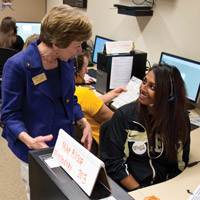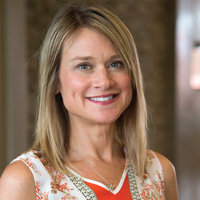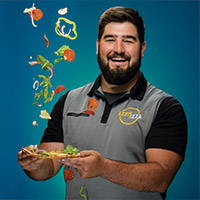Applied Knowledge
Smartphone device assesses gait
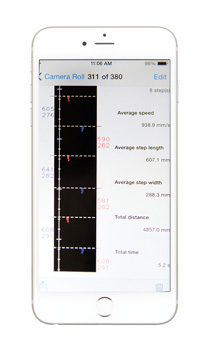
HHS inventors apply their expertise to product development. Photo provided
Smartphone device assesses gait HHS inventors apply their expertise to product development.
An expert on the mechanics of walking, Shirley Rietdyk, professor of health and kinesiology, helped design SmartGait, a device for health care professionals to assess gait patterns in people at risk of falling, typically older adults.
"Gait is a vital sign. It reflects an individual's overall health," Rietdyk says. "Gait patterns are a key predictor of mortality."
A modified smartphone, SmartGait clips on the patient's waistband. It's fitted with a downward-facing wide-angle camera that homes in on colored markers attached to the tips of the wearer's shoes.
Unlike conventional equipment for gait assessment, typically in the $10,000 to $100,000 range, SmartGait is inexpensive, does not require training to use, and is portable.
"It's simple to set up, and it provides objective data quickly and easily," Rietdyk says. SmartGait's data has been validated against the existing clinical tools.
Rietdyk and her team are in the beta testing phase, collecting input from researchers and clinicians and making final adjustments to the application. Her collaborators in Purdue's School of Electrical and Computer Engineering are Professor Babak Ziaie, PhD student Albert Kim, and Justin Kim, now a master's student.
"As an academic, I was brand-new to the process of running a business," she says. She credits Purdue's Office of Technology Commercialization and the Purdue Foundry for helping develop a business plan, do market research and navigate the patenting process.
Rietdyk, who serves as chief science officer of the company formed by her team, looks forward to taking the product to market next year. And she's already working on another invention: an app for assessing balance.
Applied Knowledge
Nursing startup assists new mothers
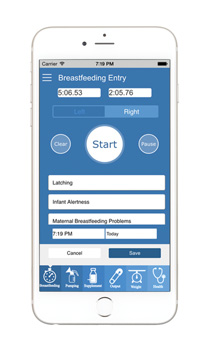
Azza Ahmed, associate professor of nursing, developed an App to assist mothers successfully breastfeed. Photo provided
Sometimes, an invention works like an intervention.
That is definitely the case for Azza Ahmed, associate professor of nursing, who wants to extend the time mothers breastfeed. "Mothers often discontinue breastfeeding within the first two months after hospital discharge," she says.
So, Ahmed designed LACTOR, a mobile app for new moms. Nursing mothers use it to enter breastfeeding data and receive immediate feedback. The software can recognize patterns indicating difficulties and then alert a lactation consultant, a real person who provides timely, tailored personal guidance.
"In our survey of mothers, we found a significant difference in breastfeeding outcomes between mothers using LACTOR and those who relied on friends and family for support," Ahmed says
. The free application runs on the iPad, iPhone and Android devices and is available at the Apple App Store and on Google Play. It's being tested in a Spanish language version.
Ahmed hopes to recruit a computer scientist to help develop the next iteration of the application — which will be available for hospitals to use.
Applied Knowledge
Teaching autistic children to speak
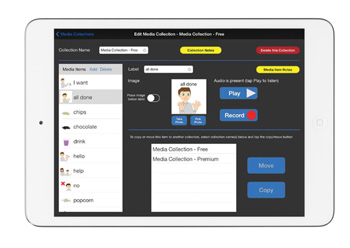
Oliver Wendt, assistant professor of speech, language, and hearing sciences, brings augmentative and alternative communication into a life-changing tool. Photo provided
The rewards of entrepreneurship take many forms.
For Oliver Wendt, assistant professor of speech, language, and hearing sciences, a research focus in augmentative and alternative communication has bloomed into a life-changing tool for individuals with severe, nonverbal autism. In 2012, Wendt released an iPad application that uses graphic symbols to teach children with severe autism to construct — and speak — simple sentences. Dubbed SPEAKall!, the app has been tremendously successful.
"Mostly by word-of-mouth marketing, the autism community has embraced SPEAKall! very quickly, and it's had a very strong impact," Wendt says. Kids with severe autism not only learn to speak, they use the app to learn social interaction — even play games like Bingo with their families and teachers. Wendt regularly hears stories of children previously considered beyond hope finally learning to communicate.
More than 12 universities and autism clinics around the world have adopted SPEAKall! in their clinical practices, and the app has been downloaded nearly 30,000 times.
In late 2013, with assistance from Purdue's Office of Technology Commercialization, Wendt founded SPEAK MODalities LLC, which enabled him to commercialize SPEAKall! in premium versions with advanced features and multi-user capabilities. The iPad version of the app is available for download through iTunes. The Android version will be released on Google Play this summer.
Currently, Wendt is developing a companion app called SPEAKmore! "It uses graphic symbols to teach advanced language concepts, enables learners to create more complex messages," Wendt says. It is slated for release in early 2016.
"We've been running our company out of the garage, on top of doing our university jobs," he says. Throughout the process, the startup experts at the Purdue Foundry assisted him and his team. "They did a great job helping us get this technology out of the research lab and into the world," he says.




